 |
A monthly publication of the United States Committee for a Free Lebanon |
 |
A monthly publication of the United States Committee for a Free Lebanon |
| Vol. 1 No. 6 | June 1999 |
|
Lebanon Report Middle East Report Intelligence Briefs |
|
MEIB Main Page Executive Director Ziad K. Abdelnour Editor Gary C. Gambill Advisory Board Rachel Ehrenfeld Gil Feiler Murray Kahl Daniel Nassif Daniel Pipes Gary P. Ratner David P. Steinman |
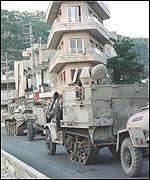 |
| An SLA convoy of thirty vehicles leaving the enclave on June 2 |
South Lebanon Army (SLA) commander Gen. Antoine Lahad unexpectedly ordered his forces to abandon the Jezzine enclave earlier this month, saying that his men were demoralized by talk of an Israeli withdrawal and "could no longer endure more slow deaths" from the escalating conflict with Hezbollah guerrillas.1 Although the Jezzine enclave, which the SLA has occupied since 1985, is not part of the Israeli-occupied security zone, sources close to Israeli Prime Minister-Elect Ehud Barak called the impending withdrawal "a litmus test for what is to come" when Barak makes good on his campaign promise to withdraw Israeli forces from south Lebanon.
The SLA forces withdrew from Azzour, Roums and other villages in the western sector of the Jezzine enclave on June 1, then from Jezzine itself two days later, and redeployed to new front line positions below Kfar Houne, 8 kilometers south of Jezzine. Hezbollah guerrillas continuously harassed the retreating militiamen as they traversed the narrow, winding road from Jezzine to Kfar Houne, killing two and wounding a third.
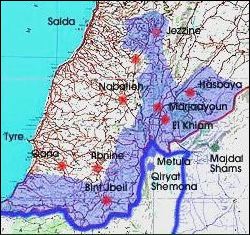 |
Reaction in Beirut
|
The mountainous Jezzine enclave is 200 square kilometers in area and consists of about thirty villages. The majority of its inhabitants are Maronite Christians. The enclave was not officially part of the "security zone" established by Israel, though the Israeli army provided vital logistical support for the SLA outposts there. Since 1985, the population of the enclave has declined from 30,000 inhabitants to less than 5,000 due to perennial insecurity and economic stagnation. |
Reaction in Israel
The short term priority for Israel has been to stem the dramatic decline in morale among SLA soldiers and ease growing fears among residents of the security zone over their future. Shortly after the Jezzine fiasco, the IDF increased its annual civil aid budget for south Lebanon from $8 million to $13 million. It is also expected that the salaries of SLA soldiers will be raised. Some of the additional funding has been allocated for cultural exchanges, including a recent trip by 100 south Lebanese notables to Eilat, Israel. "We are doing as much as we can to explain the situation to them and calm their concerns, and that as Israelis we will continue to cooperate with them as in the past until their future and ours will be guaranteed," said Lt. Col. Rafik Sa'ed, head of the IDF's civil aid program in south Lebanon.2
As for the long term, the Jezzine debacle has sharply intensified the debate in Israel over south Lebanon's future--an issue which had already been at the forefront of public opinion for years. In the eyes of many Israelis, Hezbollah has failed the unilateral withdrawal "litmus test" by disrupting the peaceful departure of SLA forces from the enclave. "Anyone who has tried to imagine how a unilateral withdrawal from Lebanon would look got the precise and embarrassing picture from Jezzine," wrote Yediot Ahronot commentator Alex Fishman.3
The status quo is also deemed untenable by a growing number of Israelis. The disaster in Jezzine has highlighted the bankruptcy of the Israeli government's effort to replace IDF troops with SLA militiamen in the majority of front line outposts in the security zone over the past year. The SLA is clearly not up to the task of holding its own against Hezbollah without close IDF combat support. Shortly after the withdrawal from Jezzine, Israel convened an emergency security cabinet meeting to discuss contingency plans for the total collapse of the SLA. Israeli officials present at the meeting approved steps proposed by Defense Minister Moshe Arens that would be taken in the event that SLA militiamen desert en masse from their posts in the security zone. Defense officials declined to specify what contingency measures were discussed.
Division in the South
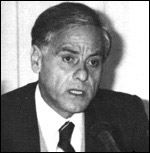 |
| Etienne Saqr |
Despite Israeli efforts to dispel the palpable state of anxiety that has descended upon residents of the security zone, latent political divisions among south Lebanese Christians have begun to resurface in the aftermath of the Jezzine pullout. Nearly 200 members SLA militiamen defected during the withdrawal because they "do not trust General Antoine Lahad [or] the Israelis," said a spokesman for Guardians of the Cedars (Lebanese Front) leader Etienne Saqr. "They know that there is no plan for the future . . . Israel and Lahad have no guarantees for the SLA members or the Christians." Although Lahad announced his resignation prior to the SLA withdrawal, Saqr's followers are now openly calling for the dissolution of the SLA in favor of a stronger militia that is capable of surviving a future Israeli withdrawal and is directly accountable to the residents of south Lebanon, rather than to the Israeli military.
This proposal has gained many advocates in Israel, including MK Uzi Landau, outgoing chairman of the Knesset Foreign Affairs and Defense Committee, and Brig.-Gen. (res.) Rafi Noy. "The aim is to have Lebanese themselves speak to Israelis in the name of residents of south Lebanon," said Dr. Mordechai Nissan, a lecturer in Middle East studies at the Hebrew University. The militia would be revitalized "with a new leadership and a more dynamic and independent military policy," he said. "This would be coupled with a political council in the south, which would act and speak in the name of all of the residents of the region, not only Christians."4
1 Approximately 150 SLA militiamen and 42 civilians have been killed in the Jezzine enclave since it was occupied in 1985.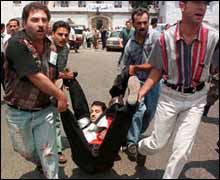 |
| An injured man is carried out of the courtroom in Sidon |
On June 8, two gunmen entered a courtroom in the southern city of Sidon with AK-47 assault rifles and a grenade launcher concealed under their robes and then opened fire, killing three judges and a prosecutor. A lawyer, the court clerk, two policemen and a relative of one of the defendants were wounded during the shootout. Lebanese security forces and army troops surrounded the courthouse within minutes of the shooting, but failed to apprehend the assailants, who dropped their weapons and fled. A large-scale manhunt was launched shortly thereafter.
According to sources in Lebanon, the evidence in the case clearly points to the involvement of Palestinians from the Ain al-Hilweh refugee camp. Thus far, 25 Palestinians have been detained for questioning by security forces. Moreover, based upon the testimony of several witnesses, the escape route of the gunmen is believed to lead to the camp. Shortly after the killings, Lebanese security forces established roadblocks at all entrances to the Ain al-Hilweh and enforced strict security measures at four other refugee camps in south Lebanon.
However, top Lebanese government officials have feverishly sought to blame Israel for the massacre--typical of past categorical responses to political killings in which pro-Syrian allies are implicated. Speaking at Beiteddine Palace on June 11, President Lahoud blamed Israel for the assassinations and warned that "the enemy plots . . . are poised to continue." Then, in an afterthought that clearly identified from whom he was taking his lines, Lahoud added that "the plots will not succeed thanks to our unity and alliance with Syria. We've nothing to fear because we're immune to any act of aggression."
Another telling sign of the government's inability or unwillingness to conduct a thorough investigation is the fact that security forces have not been given permission to enter Ain al-Hilweh. This has outraged many in Lebanon. "The authorities should chase the criminals to any hiding place they might take," said Shaker Abu Suleiman, the head of Parliament's Committee on Administration and Justice. "There should be no areas outside the law in Lebanon under the pretext of just causes, including the Palestinian cause," he told reporters.
|
Interior Minister Michel Murr September 25, 1997 |
Due to the virtual immunity from prosecution enjoyed by residents of the camp, Ain al-Hilweh has been linked to a growing, unprecedented wave of violence over the last year:
9 April 1998: Ghazi Adwan, a high-ranking official of Yasser Arafat' Fatah movement was murdered in Jinsnaya on the eastern outskirts of Sidon.
16 April 1998: Fatah lieutenant Ahmad Boujeiri escaped an assassination attempt in Ain al-Hilweh.
9 August 1998: A Palestinian was wounded in a bomb blast near the office of Fatah leader Col. Munir Maqdahin in Ain al-Hilweh.
19 May 1999: Fatah official Amin Kayed his wife Fadia were killed in a drive-by shooting in Ain al-Hilweh.
21 May 1999: Fatah official Jamal Dayekh lost both his legs in a booby-trapped car explosion in the Sit Nassab district of Sidon.
The Sidon massacre is distinguished from past outbreaks of violence linked to Ain al-Hilweh in that the victims were not rival Palestinians or Sunni fundamentalists, but respected Lebanese judges. Whether the perpetrators of this crime will be allowed to hide amid the 60,000 refugees in the camp remains to be seen.
1 There is some evidence that Saadi may have been involved in the Sidon massacre. One of his men was found murdered in Tripoli shortly afterwards, fueling speculation that he was killed because he had information about the attack. Investigative sources have also suggested a link between the Sidon killings and a bank robbery in Damour on June 16 by two Palestinian members of Esbat al-Ansar, one of whom survived and has been interrogated extensively.According to informed sources, Syria is laying the groundwork for a new "political equation" in Lebanon in the aftermath of last month's Israeli election. Prior to the election, Damascus had given its full support to the Lahoud regime, at the expense of its other Lebanese allies, notably ex-prime minister Rafik Hariri and Druze chieftain Walid Jumblatt. In fact, Damascus had tolerated for some time the Lahoud regime's "war on corruption" which has targeted Hariri, Jumblatt and others in favor with the Syrians and the cycle of mutual recrimination that has come to characterize Lebanese political discourse in recent months.
The most recent (and egregious) incident was provoked by an article that appeared in Rafik Hariri's newspaper, al-Mustaqbal, which attacked the "modest origin" of Prime Minister Selim Hoss and "the efforts he has made to make his way in Beirut society." Not long afterwards, anonymous "ministerial sources" sent a dispatch to the National News Agency accusing Hariri of trying to "destabilize the state on the political and economic levels because he cannot bear the fact that he was evicted from office" and (perhaps the most serious charge in Lebanon nowadays) of trying "to separate the Lebanese and Syrian tracks of the peace process." The article, which was widely distributed throughout the country on June 14, caused an uproar that has not yet subsided.
Not surprisingly, Syrian President Hafez Assad is said to be concerned that this infighting has gotten out of hand and could weaken the "internal Lebanese front" and make Beirut susceptible to direct peace overtures from the new Israeli Barak administration. The fear in Damascus is that Israel may exploit divisions in Lebanon at this critical stage in the peace process, weakening Beirut's commitment to the joint Syrian-Lebanese negotiating track.
Damascus has told the Lahoud administration to "mend fences" with its opponents, and has communicated to Hariri, Jumblatt and other Syrian allies that they should tone down their criticism of the current government. Syrian officials hope that the tide of mutual recriminations between the government and the opposition will diminish considerably in advance of next year's parliamentary elections.
Hariri's recent four hour meeting with Assad in Damascus fueled speculation that his return as prime minister is in the works. While the return of Hariri, who left the government after Lahoud's election to the presidency last fall, is deemed unlikely by most informed sources, he will probably wield more power behind the scenes in the months ahead. Former president Elias Hrawi also met with the Syrian leadership recently, indicating that Syria has not abandoned the previous regime and will not countenance a full-fledged campaign by Lahoud to discredit it.
According to sources in Lebanon, Damascus is backing the rise of a dissident branch of Hezbollah headed by the group's former secretary-general, Sheikh Sobhi Tufaili.
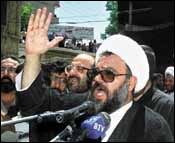 |
| Sobhi Tufaili |
Tufaili was expelled from Hezbollah in January 1998. After a violent confrontation between his followers and army troops later that month, the Hariri regime reportedly requested and received permission from the Iranian and Syrian governments to move against him. Lebanese military prosecutor Nasri Lahoud issued a formal warrant for the arrest of Tufaili and 22 of his followers on charges of "forming armed groups, endangering national security and killing soldiers and civilians," while infantry and tank forces conducted a massive manhunt for him in the Bekaa valley and laid siege to his hometown of Britel.
Tufaili managed to avoid capture, however, and his followers laid low for over a year. Then, on April 7, 1999, gunmen loyal to Tufaili overran a major Hezbollah arms depot containing machine-guns, rocket-launchers, mines and other equipment in the village of Nabichit near Baalbeck. Tufaili's forces have since become solidly entrenched in the Bekaa valley and are now recruiting Hezbollah militants who have turned away from Hezbollah Secretary-General Hassan Nasrallah.
Nasrallah appears to be surrounding himself with loyal men from his own region, southern Lebanon, while Tufaili's demographic strongholds are the Shi'ite residents of the Bekaa Valley and the southern suburbs of Beirut. Sheikh Zuheir Kanj, former spokesman of the Assembly of Moslem Ulemas, has reportedly now sided with Tufaili.
The rivalry between Tufaili and Nasrallah mirrors the differences that have emerged in recent months between the radical followers of Iranian spiritual leader Ali Khamenei and the Syrian regime. Syria's decision to back Tufaili is largely inspired by U.S. pressure to rein in Hezbollah. Damascus wants to see Hezbollah limit its military campaign to assaults on the Israeli-backed Southern Lebanese Army (SLA), rather than Israeli army patrols. Hardliners in Teheran, on the contrary, have called for Hezbollah to escalate its military operations. It appears that Nasrallah, whose clan has close relations with hardliners in the Iranian government, may have resisted pressure from Damascus to limit the scale of Hezbollah operations.
Investigations into criminal misconduct under the regime of former Lebanese Prime Minister Rafik Hariri have continued to expanded in scope since Part I (on the Independent Municipal Fund scandal) and Part II(on investigations targeting the Council for Development and Reconstruction, Environment Ministry, Beirut Port, and National Bureau of Medicines) of this series were published in the April and May issues of MEIB. The investigative dragnet has expanded into the following areas.
The Directorate-General of Antiquities (DGA)
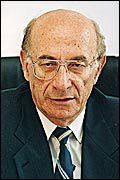 |
| Camille Asmar |
Camille Asmar, the former director-general of the DGA and four employees were charged with embezzling public funds by making illegal payments to contractors in exchange for bribes. Chief Public Prosecutor for Financial Fraud Khalil Rahhal has also accused 18 contractors, including Asmar's two sons, Daniel and Manuel, of accepting payments for services which they never provided. All of the suspects face up to five years in prison with hard labor.
Ministry of Transportation
The acting and former directors-general of the ministry of transportation, Hanna Suleiman and Imad Nawwam, were taken into custody earlier this month in connection with a scandal over tourist resorts built illegally on state property during the civil war that were allowed to continue operating by the Hariri administration. Former minister of transportation Omar Miskawi was interrogated for over seven hours by Assistant State Prosecutor Rabia Omeish about allegations that he ignored the violations.
Ministry of Electricity and Water Resources
Omeish has also questioned the current and former directors-general of the Ministry of Electricity and Water Resources, Fadi Qmeir and George Abu Zeid, in connection with illegal construction projects on river banks.
The Judiciary
On June 2, the Lebanese Cabinet decided to fire 70 judges and gave them 45 days to resign voluntarily. Those who decline are expected to be indicted on charges of corruption.
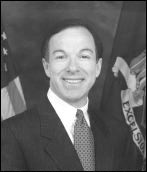 |
| Rep. Michael P. Forbes |
Forbes drafted the bill shortly after his legislative director, David Silverstein, attended a session of the Lebanon Study Group sponsored by the United States Committee for a Free Lebanon (USCFL) and the Middle East Forum. USCFL President Ziad Abdelnour called a bill "a milestone in reversing the Syrian occupation of Lebanon" and said that USCFL will actively work to ensure that it is passed. "I think that there will be very few, if any, members of Congress willing to oppose the restoration of a sovereign nation's independence."
The core stipulations of the bill would prohibit economic and military assistance to both Syria and Lebanon until "30 days after the President certifies to the Congress that Syrian military, security, and intelligence forces and their proxies in Lebanon have been completely withdrawn from Lebanon and that the Government of Lebanon is certified to have been freely elected and wholly democratic in nature."
Congressional sources say that the bill is a binding resolution--the President cannot waive its implementation. The House International Relations Committee is expected to convene hearings in the next few months to deliberate on the bill, which should reach the House floor for a vote later this year. The Senate must then approve a companion bill before it becomes law.
Incoming Israeli Prime Minister Ehud Barak is expected to resume negotiations with Syria during the first 100 days of his administration. The following is a brief insider's guide on what to expect.
The Players
As prime minister and defense minister in the new government, Barak will undoubtedly maintain tight control over all major aspects of peace negotiations. Sources close to Barak said earlier this month that he will appoint a special "peace administration" (minhelet shalom) run directly from his office. The foreign ministry will be entirely bypassed in bilateral negotiations while retaining authority over multilateral talks on regional issues such as economic relations, water and Palestinian refugees.
An overview of who will be leading the bilateral negotiating team is revealing. Key architects of the Oslo peace accords, such as MK Yossi Beilan and former prime minister Shimon Peres are notably absent. There are no doves or idealistic visionaries calling the shots this time around. Security is the name of the game for Barak--the top echelon of the negotiating team consists of four former generals.
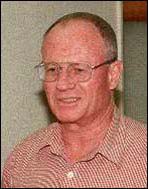 |
| Danny Yatom |
The team will be headed by Gen. Danny Yatom, former director of the Mossad under Netanyahu. Yatom will oversee three separate delegations to handle negotiations with the Palestinians, Syria and Lebanon. The Palestinian track will reportedly be headed by Gen. Amnon Lipkin-Shahak, Barak's successor as army chief of staff. Lipkin-Shahak, a member of the new Center Party, was recently elected to the Knesset. The Syrian track will be headed by Gen. Uri Saguy, a former head of head of military intelligence. Gen. Yossi Peled, former head of the army's northern command, will oversee the Lebanese track.1
Gil'ad Sher, a prominent attorney with specialization in international law, will be the legal adviser to the "peace administration." Sher drafted the security addendum for the Oslo B agreement. After that, he was briefly assigned to the IDF's Planning Branch, serving as a special advisor to Major General 'Uzi Dayan.
Another important player in the peace talks will be Barak's diplomatic adviser, Alon Pinkas. Earlier this month, Pinkas drafted a seven-page document titled "The Diplomatic Agenda - The First Hundred Days" which outlines in detail the political and diplomatic objectives for the Barak administrations's first 100 days.
Itamar Rabinovich, who headed the previous Israeli negotiating team in the talks with Syria, is expected to play an important role behind the scenes (as president of Tel Aviv University, he will be unable to assume an official position in the Barak administration). He has been a close advisor to Barak for years and, on occasion, a secret envoy--in May, Barak sent Rabinovich on a special mission to Washington.
Another behind the scenes player will be Barak's brother-in-law Doron Kohen. According to a recent article in the Israeli daily Ma'ariv, Kohen "is the closest person to the prime minister-elect." Although Barak consults with many advisors, "at the end of the day . . . there are two left: Barak and Kohen. That is where the tough, final decisions are made."2
The Plan
The first step for Barak's Syria team will be to launch contacts with Damascus by stating Israel's willingness to withdraw entirely from the Golan Heights in exchange for a comprehensive peace treaty with Syria. Once the talks start, the Israeli team will be instructed to negotiate a two-stage withdrawal from the Golan Heights, conditional upon strict security arrangements.
The surrender of the Golan Heights will take place in two stages: Everything but the promontory ridge area will be given back in the first stage, after which normal diplomatic relations will be established. After a period of five or more years, this remaining area will be restored to Syrian control. The security arrangements will center around two principles:
The first principle will be limitations on Syrian military strength in the Golan. There will be limitations on the number of Syrian Army units that will be permitted to deploy in the heights--Barak has said only one division. Syrian tanks would be parked in hangars, and their ammunition kept in separate bunkers several kilometers away. Limits on Israeli and Syrian forces will extend throughout a demilitarized zone, the depth of which will be heavily in Israel's favor--the ratio discussed at Wye Plantation was 6:4 (e.g. 6 km on Syria's side, 4 km on the Israel side) and Barak will reportedly try to increase it to 2:1.
The second principle guiding the Israeli negotiating team will be "transparency": Syrian military operations in and behind the Golan heights should be directly observable by the Israelis. Negotiators will seek to maintain three early warning stations in the Golan at Mount Hermon, Avital, and Bantal. Joint patrols by Syrian and Israeli officers and unscheduled inspections are also likely to figure into the final settlement.
The Israelis will not, however, permit the border with Syria to touch Lake Tiberias. Droughts have caused the lake to recede along its eastern bank, the Syrians would not have access even if the 4 June 1967 borders are restored. In addition, engineering projects will be carried out to divert the water westward and prevent Lake Tiberias from reaching the border during rainy seasons.
In order to make sure that a "warm peace" follows the Israeli withdrawal, the negotiating team will also seek detailed commitments from Syria on matters ranging from bilateral trade regulations to the frequency of El Al flights to Damascus.
Meanwhile, Israel will strive to maximize its compensation package from the United States. Several billion dollars in economic aid will be requested to cover the costs of relocating military bases, moving settlements out of the Golan and building advanced early warning stations in the Galilee. Israel is also likely to receive J-Stars spy planes, real-time access to satellite information, and other means. It is possible that Barak may also demand that the U.S. formalize its commitment to Israel in the form of a defense pact (an objective which has eluded successive Israeli administrations for decades). Barak has not yet reached a decision on whether to allow the deployment of US peacekeeping troops on the Golan Heights.
1 Other former generals expected to play leading roles in the Barak administration are Zvi Stauber (Barak's top foreign policy aide), Yoni Koren, Hayim Mandel, and Omer Bar-Lev.Yasser Arafat's intelligence agencies have succeeded in neutralizing armed activities by the al Kassam brigades, the military arm of Hamas in the occupied territories--reportedly with the assistance of Israel's Shin Bet and the CIA, which now has a major presence in Ramallah. Gen. Amin Al Hindi, head of PA's General Intelligence service, is the central figure responsible for contacts with these other agencies.
Al Hindi met recently with Abdulaziz al Rantissi, former head of the Hamas military branch's intelligence service, Ezzedin al Kassam, in his cell in Gaza, where he was jailed on April 9, 1998. Al Hindi convinced him to sign a letter urging members of the brigades to freeze all military actions. Meanwhile, Col. Mohamed Dahlan, head of the Preventive Security service in the Gaza strip, met with the current head of the al Kassam brigades, Mohamed Daif, who is said to be living under a fake identity in the Jabalia camp. Daif, who is considered one of the 10 most wanted militants by the Shin Bet, Israel's internal security agency, made an arrangement with Dahlan that included protection for himself. Daif reportedly called off planned attacks against colonies established by Israel's Ghouch Katif movement by brigade units operating in the "dangerous triangle" between Deir Al Balah and the camps of Chatey and Khan Youne.
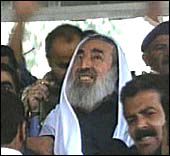 |
| Ahmed Yassin |
While neutralizing the military wing of Hamas, Arafat has succeeded with American help in cutting off millions of dollars that Hamas had been receiving from the outside. Because of this funding shortage, Hamas' extensive network of social services which bolsters its popularity among impoverished Palestinians has declined dramatically. Consequentially, support for the group has dropped to a record low of 10%, according to recent polls.
In light of these developments, Ahmed Yassin, the spiritual leader and founder of Hamas, caused a stir by openly participating in a meeting of the Palestinian National Council in April. Yassin not only gave tacit recognition of Arafat's authority by attending the meeting, but publicly endorsed Arafat's decision to postpone the declaration of an independent state.
Yassin was subsequently denounced by hardline Hamas leaders abroad, most notably Khaled Meshal, head of the political bureau, Mussa Abu Marzuk, the movement's treasurer and Imad Alami, its representative in Damascus. Fierce criticism of Yassin, whose character was until recently considered beyond reproach even by secular Palestinians, has gradually begun to emerge inside the occupied territories as well. In Gaza, a militant Hamas faction calling itself "Units of the Martyr Yahya Ayash" distributed leaflets earlier this month charging Yassin with responsibility for the deaths of several members of the al Kassam brigades and called upon him to "come to your senses or resign."
The ultimate objectives of the two opposing camps remain the same, however: putting an end to the Oslo process, supplanting the secular regime of Yasser Arafat, and (eventually) driving the Israelis out of Palestine altogether. The main differences between the two camps concern tactics.
Yassin's Faction
Yassin and his followers have made a calculated decision to forgo violent attacks against Israel for the time being and focus their time and effort in rebuilding the organizational base of the movement and in revitalizing its educational and social welfare institutions. Achieving these short term goals necessitates cooperation with the PA. However, this is a short-term compromise. In a May 2 interview, a spokesman for Yassin, Dr. Mahmoud Zahar, noted that the reduction in tensions between Hamas and the PA should not be misconstrued as an abandonment of its core objectives. "We are going to achieve our plan. So we are just giving [PA President Yasser Arafat] a chance in order to achieve a step," said Zahar. The interview continued:IMRA: But it would not be a last step.
Zahar: No.
IMRA: All of Palestine is the last step?
Zahar: Yes.
IMRA: Now between that first step and that later step, you see a rest period?
Zahar: It would depend on the Israeli side. If they are going to continue their violations of our rights that would be one thing. We are ready for a cease-fire.
IMRA: If you are left with a cease fire that leaves you with the West Bank and Gaza but not the rest of Palestine which you also consider a Moslem Wakf - is this a cease fire forever?
Zahar: This would be a cease fire that would be declared for a specific amount of time - one year, two years, five years. We are not speaking about a cease-fire now while the other side is not accepting it.1
Meshal's Faction
The Hamas leadership in Jordan and Damascus, being divorced from the exigencies of organizational development on the ground, cling to terrorist activity against Israel as an instant crowd-pleaser to bolster their popularity among the teaming masses in Gaza. Meshal conceded during a meeting in Amman on March 26 that it had become highly difficult or even impossible for the Ezzedine al Kassam brigades to conduct suicide bomb attacks against Israel like those carried out in 1997-98 due to "repressive measures" by the Palestinian Authority's security agencies.
Meshal has hinted, however, that different types of suicide assaults could spring from new anti-Israeli alliances. Western security sources have reported that Hamas representatives attended numerous meetings at the Fayruzi Palace in Iran, along with officials of Iran's foreign intelligence service, leaders of fundamentalist Islamic organizations in Jordan, and Hamas and Hezbollah representatives. The groups also met recently at the Iranian Embassy in the al-Janah area of Beirut. The meeting was said to have been attended by top officials from the Iranian Embassy, an official from the Middle East department of Iran's VEVAK, and representatives from the Hezbollah, Hamas and the Popular Front for the Liberation of Palestine - the General Command as well as Jordanian fundamentalist groups. A report on the "shuttle meetings" between Teheran and Beirut asserts that the consultations focused on issues regarding fundamentalist Islamic activities in Jordan amid growing Israeli intelligence activity in the kingdom.
Sources close to Meshal have said that an alliance is currently being forged at the Rashidiye camp in southern Lebanon between Hamas' covert military units and the Islamic Jihad in Palestine, whose headquarters are located in Damascus. In addition, the two movements are dovetailing their activity more closely with Hezbollah in Lebanon and with Iran's Pasdarans, who are gaining a strong foothold in the main Palestinian camps at Al Biddaouji in northern Lebanon and Ain al-Hilweh and Rashidiye in the south. Fighters are being recruited in unprecedented numbers in the camps, including from among supporters of Yasser Arafat's Fatah movement. Iran's Institution of Martyrs headed by mullah Hussein Rahimian is turning over large amounts of cash to families of the recruits.
The "volunteers" are sent to Hezbollah camps in the Oronte valley east of the Baalbeck Valley for basic training before traveling on to Teheran for further instruction in Pasdaran camps in the suburbs of the Iranian capital. Similar enrollments are taking place in Palestinian camps in Jordan, for instance the Bakaa camp near Amman. In the latter facility, however, Jordanian intelligence has let Arafat's men infiltrate the personnel and put a halt to recruitment. During a meeting on April 1, Arafat and Jordan's new king, Abdallah II, agreed that the measures being applied to Hamas by the Palestinian Authority would henceforth apply to all camps located in Jordan.
A tripartite committee sees to operational liaison between Hamas, Jihad and Hezbollah. It is composed of Meshal and his movement's representative in Teheran, Mustapha al Kanou; Jihad is represented by its secretary-general, Ramdan Challah, its leader in Lebanon, Abu Imad and the chief of its military wing, Anwar Abu Taha; Hezbollah is represented by its military chief, Fouad Chakar, known under the name of Hajj Mohsen. The panel organizes the training of new Kamikaze who will be assigned missions at a later date.
1 Interview with IMRA (Independent Media Review & Analysis), 2 May 1999.According to Israeli intelligence sources, Yasser Arafat's Palestinian Authority (PA) is attempting to covertly build a military force capable of challenging the Israeli Army, in violation of the Oslo peace accords.
On June 9, the Israeli Defense Force (IDF) discovered a large underground tunnel connecting the Gaza Strip to Egypt. The tunnel, measuring 75 meters in length and situated 8 meters beneath the ground, was equipped with a small railway, lighting, and telephone lines. The tunnel was the 23rd discovered by the Israelis over the last two years. Israeli sources described it as ''the most sophisticated'' that has been uncovered to date.
According to IDF Colonel David Faras, an army brigade commander in Gaza, the PA has been using these tunnels to stockpile armaments that are prohibited by the Oslo agreements, such as anti-tank missiles. He said that Israel also had intelligence indicating that the tunnel had also been intended for secretly transporting captured Israeli soldiers out of the Gaza Strip.
Earlier this month, Israeli intelligence has also uncovered major arms shipments smuggled into the West Bank city of Nablus, including advanced German MP-5 submachine guns, which are designed for urban combat.1
The Oslo II Interim Agreement limits the number of firearms which PA security forces can have to 15,000 and stipulates that various types of heavy weaponry cannot be possessed in any quantity. The agreement also restricts the number of PA security forces to 30,000.
However, according to a report last year by Israeli intelligence, there is "a concentrated, continuous and deliberate effort by officials in the Palestinian Authority to smuggle arms into PA territories so as to increase and vary the quantity and quality of weapons in their possession."2 The PA has not only exceeded the numerical limits on firearms by about 40,000, but now possesses Katyusha rockets and other heavy weaponry that are explicitly banned. In addition, the PA has established a number of small factories which produce hand grenades and ammunition, also contrary to agreements signed with Israel.
Intelligence sources also say that there are still thousands of unauthorized police in excess of the Oslo II limitations--the ratio of security forces to residents in PA-controlled territory is 1:60, making it the most heavily policed region in the world (the ratio in Israel, by contrast, is 1:236).
1 Ha'aretz, 18 June 1999.According to the London-based newspaper Al-Zaman, an armed clash erupted on May 24 between two Iraqi Republican Guard units in the Suwayrah camp, strategically located 60 kilometers south of Baghdad along the two main routes from southern Iraq to the capital.1 The paper cited anonymous witnesses who recently arrived in London from Iraq.
The confrontation began when a military force comprised of the Adnan Republican Guard Tank Battalion and a company from Iraq's 33rd Special Forces Brigade attempted to leave the camp at three o'clock in the morning without a required permit from the intelligence department headed by Qusay Hussein, the son and heir apparent of Iraqi President Saddam Hussein. An intelligence officer on guard at the time informed the camp commander, Lieutenant-Colonel Muhammad Ulwan al-Dulaymi, that the units were attempting to leave the premises. When Lt. Col. al-Dulaymi confronted the units, the tank battalion commander, Colonel Sabir Aziz al-Shati, reportedly aimed his tank's gun at al-Dulaymi's residence. Al-Dulaymi then ordered two Republican Guard infantry battalions to confront the units. It is not clear which side began shooting first, but in the ensuing melee a number of officers and troops from both sides were killed, including both al-Shati and al-Dulyami.
Qusay Hussein arrived at the camp with other high ranking military officials to question the guards who were on duty at the time and to arrest the surviving rebellious officers. Afterwards, security was tightened in some military districts of Baghdad and at checkpoints located between Baghdad and the Suwayrah camp. suggesting that the incident was deemed to be part of a larger threat to the regime.
The Iraqi government has fended off other challenges within the military in recent months. Reports of armed incidents, particularly in units stationed around Basra in southern Iraq and Mosul in the north, have been frequent and purges in the officer corps have become commonplace. In addition, several assassinations of military officers loyal to the regime have occurred. The government has been redeploying its forces throughout the country over the last month, possibly in preparation for defensive action against other military units. The clash in Suwayrah (though still unconfirmed) may be of critical importance, since it involved units of the Republican Guard--one of the principal pillars of the Iraqi regime. During Operation Desert Fox last December, Saddam interposed Republican Guard units between the capital and regular army units. If political dissent has now infiltrated this trusted asset of the regime, the end for the Iraqi leader may not be far off.
1 Al-Zaman, 2 June 1999.On May 19, Russia and Syria signed an agreement on scientific, technical and economic cooperation in the use of atomic energy. "The way of Russia and Syria to the signing of this agreement was a long one," said Russian Minister of Atomic Energy Yevgeny Adamov at the signing. "Now it is very important for us to start working on its implementation without delay." Adamov noted that several nuclear facilities had been built in Syria with the assistance of the Soviet Union and declared that "Russia is retaining this cooperation potential." Ibrahim Osman, Director-General of the Syrian Commission for Atomic Energy, said that "the agreement will further expand good relations between Russia and Syria. It is laying the foundation of Syria's infrastructure for the 21st century."1
The Comprehensive Cooperation Agreement reportedly stipulates that Russia will build two new nuclear reactors in Syria "to be used for peaceful purposes."2 Nevertheless, Israeli Foreign Minister Ariel is known to have made at least one visit to Moscow to persuade the Russians to call off the impending deal. The agreement is also sure to provoke the ire of the United States, which has foiled numerous Syrian attempts to acquire nuclear technology in recent years. In 1995, Washington pressured Argentina to back out of a project for Syrian-Argentine cooperation in this field. It has also exercised similar pressure on North Korea, China and South Africa to forgo any nuclear cooperation with Damascus.
While some have argued that the Syrian-Russian nuclear agreement is merely the next step in a pattern of cooperation that has been underway for some time, many analysts caution that the current government in Moscow may have less inhibitions than its predecessors about supplying nuclear technology to Syria and other rogue nations. "I believe that the Russian government under Yevgeny Primakov has made a strategic decision to reestablish and expand its ties with nations the Soviet Union regarded as clients, but the West generally recognizes as rogue states," said Frank Gaffney, former U.S. assistant secretary of defense and director of the Center for Security Policy. "It is, among other things, doing so by providing them with advanced conventional arms, nuclear, chemical and biological weapons-related technologies and ballistic missile systems."
1 Itar-Tass, 19 May 1999.
Alleged Syrian Spy Arrested in Germany
Iran Involved in Afghan Uprising
Former UK Intelligence Agent Says Qaddafi Personally Ordered 1988 Pan Am Bombing
Israel Shifts Intelligence Gathering in West Bank, Gaza to Army
Iran Could be Acquiring Taepo-Dong-2 Missile Capable of Hitting Europe
Netanyahu Reveals Secret Negotiations with Syria
Barak Preparing to Appoint Levine as Mossad Chief
Islamic Jihad Executed Three who Allegedly Spied for Mossad
Saddam Forms "Emergency Mini-Cabinet"
Palestinian Security Forces Include Wanted Terrorists
Bomb Kills Seven Iranian Exiles
UK Intelligence Was Warned of 1982 Argov Assassination
Assad Discharges Air Force Chief
US and Libya Hold First Official Talks in Two Decades
Israeli Volunteers Fought Alongside Yugoslav Army in Kosovo
Moderate Iranian Newspaper Calls for Syrian Withdrawal from Lebanon
Alleged Syrian Spy Arrested in Germany
15 May
Police in the northern German town of Stade have arrested a Syrian on suspicion of spying, the federal prosecutor's office said today. The 43-year-old man had allegedly been tracking members of the Syrian opposition based in Germany since 1995. The suspect, identified only as Ahmed A-W, appeared before a magistrate on May 13 and was charged with providing the Syrian secret service with information about individuals and companies of Syrian and Lebanese origin.
Iran Involved in Afghan Uprising
21 May 1999
A senior official of Afghanistan's Taleban movement, Mullah Amir Khan Muttaqi told the BBC that Iran was involved in a failed uprising in the Western Afghan city of Herat. Around 100 people were arrested and eight ringleaders of the uprising killed and their bodies put on display. The incident is expected to revive tensions between the Taleban and Iran, which admits supporting the Afghan opposition but has denied providing it with arms.
Former UK Intelligence Agent Says Qaddafi Personally Ordered 1988 Pan Am Bombing
23 May 1999
The Sunday Times quoted a former UK intelligence officer as saying that Libyan leader Muammar Qaddafi personally ordered the 1988 bombing of a Pan Am jumbo jet over Lockerbie, Scotland in retaliation for a US raid on Tripoli in 1986. The UK government issued a last-minute gag order against the newspaper to prevent it from publishing any details of the intelligence operation that supposedly implicated Qaddafi.
Israel Shifts Intelligence Gathering in West Bank, Gaza to Army
24 May 1999
Yediot Ahronot reported that Israel has shifted responsibility for intelligence gathering in the areas of the West Bank and Gaza controlled by the PA from the Shin Bet internal security agency to the Israeli army intelligence service, which gathers information about foreign governments. However, the report said that Shin Bet would continue to oversee counter-terrorism operations and coordination with PA security forces.
Iran Could be Acquiring Taepo-Dong-2 Missile Capable of Hitting Europe
24 May 1999
Defense Weekly reported that a senior Pentagon intelligence official has warned that Iran could be on the verge of acquiring North Korea's Taepo-Dong-2 missile, which would allow it to strike targets in the heart of Europe. David Osias, the Defense Intelligence Agency's top missile expert, said that the No Dong ballistic missiles (which include the Taepo-Dongs) "seem to be proliferating much the way Scuds did a few years ago." He added that "currently, perhaps a dozen countries have Scud missiles . . . the graduation to No Dongs would have a profound impact on the ability of most of these countries to target others within their regions."
Netanyahu Reveals Secret Negotiations with Syria
30 May 1999
An Israeli cabinet statement revealed that the government of outgoing Israeli Prime Minister Benjamin Netanyahu held secret talks with Syria over the last year. The statement quoted Netanyahu as saying that "unofficial contacts" had taken place with Syria for about a year but led to no agreement because of his opposition to a complete withdrawal. The talks are said to have involved mediation by Omani Foreign Minister Yusuf Ben Alawi, the European Union (EU) special envoy to the Middle East, Miguel Moratinos, and US businessman Ronald Lauder.
Barak Preparing to Appoint Levine as Mossad Chief
1 June 1999
Sources in Israel indicated that Prime Minister-elect Ehud Barak is preparing to appoint Amiram Levine as head of the Mossad. Levine, who has been in charge of Mossad's operations since last November, would replace Ephraim Halevy, who was appointed head of the Mossad in April 1998 after a series of bungled operations by the agency. The sources said that Barak's decision reflected his determination to crack down on Islamic groups, particularly Hamas, that are trying to sabotage the Middle East peace process. The sources said that Levine has already proposed the elimination of three leading Islamic militants: Mohammed Deif, head of operations for Hamas in Gaza, Imad Al Alami, the head of foreign operations for Hamas and Imad Moughnia, a senior Hezbollah official.
Islamic Jihad Executed Three who Allegedly Spied for Mossad
1 June 1999
The Syrian newspaper Al-Arab al-Yawm reported that Syrian security forces discovered a secret prison operated by the Islamic Jihad movement, accessible from the group's Damascus office via a secret door. Three people were allegedly executed inside the prison, including Abdel-Qadir Salih, who was kidnapped by Islamic Jihad after the Israeli Mossad assassinated its Secretary General, Dr. Fathi al-Shaqaqi, in Malta. Dr. Ramadan Abdullah Shallah, Islamic Jihad's new secretary-general, apparently believed that Salih divulged Shaqaqi's secret movements to the Mossad prior to the assassination. The two other who were executed in the prison were also alleged to have spied for the Mossad. The Syrian government is expected to take measures to limit the group's freedom of movement between Syria and Lebanon.
Saddam Forms "Emergency Mini-Cabinet"
3 June 1999
Sources in Iraq report that Saddam Hussein has formed an emergency mini-cabinet consisting of his sons Uday and Qusay;Vice Chairman of the Revolutionary Command Council Izzat Al-Duri, Vice President Taha Yasin Ramadan, and Lieutenant General Ali Hasan Al-Majid, also a member of the Revolutionary Command Council and former defense minister. This measure was taken "in anticipation of an escalation of the confrontation with the United States," say the sources. All members of the mini-cabinet have been granted "wide powers to confront any events in Iraq."
Palestinian Security Forces Include Wanted Terrorists
6 June 1999
Ami Ayalon, the head of Israel's Shin Bet internal security agency, told a cabinet meeting that that 45 "terrorists" wanted by Israel for extradition were serving in the PA security services, some of them in senior positions.
Bomb Kills Seven Iranian Exiles
9 June 1999
A truck bomb exploded in Baghdad near a bus carrying members of the Mujaheddin Khalq, an Iranian opposition group, killing seven and wounding twenty. It was the second attack this week against the Mujaheddin Khalq.
UK Intelligence Was Warned of 1982 Argov Assassination
9 June 1999
Ha'aretz reported that UK intelligence may have had advance notice of the June 1982 assassination of Israeli Ambassador to the UK Shlomo Argov, which was used as a pretext by Israel for launching its invasion of Lebanon three days later. Ronald Waldron, a British intelligence agent who reportedly infiltrated Palestinian terrorist organizations, told Ha'aretz that he had passed on detailed information about the assassination plot to his superiors.
Assad Discharges Air Force Chief
10 June 1999
Syrian President Hafez Assad discharged his air force commander, General Mohammed Khouli, after he reached the legal retirement age of 62. The retirement of Khouli, who was once considered a possible successor to Assad, is seen as paving the way for the succession of Assad's son, Bashar, to power.
US and Libya Hold First Official Talks in Two Decades
11 June 1999
The United States and Libya held their first official talks in nearly 20 years. Libyan Ambassador Abuzed Omar Dorda met with US envoy Peter Burleigh and British Ambassador Jeremy Greenstock at the United Nations to discuss the possible lifting of UN sanctions against Tripoli. Dorda said afterwards that the meeting "will lead us all to turn over the last page of the past and then we will open a new one for the future." In reaction to Dorda's comments, a US official said "while I don't think that is a mis-characterization, in order for the page to be turned they need to fully live up to their obligations" under the UN resolutions.
Israeli Volunteers Fought Alongside Yugoslav Army in Kosovo
11 June 1999
The Israeli daily Yediot Aharonot reported that around 40 Israelis, most of Russian descent, traveled to Kosovo to fight on the side of Yugoslav forces against the Kosovo Liberation Army (KLA). One volunteer told war correspondent Ron Ben-Yishai that he and his compatriots joined the foreign volunteers' unit fighting alongside Yugoslav government forces "out of gratitude for the help they had extended the Yugoslav Jews [during World War II]" and to stop radical Muslims from "trying to seize control over Europe."
Moderate Iranian Newspaper Calls for Syrian Withdrawal from Lebanon
15 June 1999
An article in the Iranian newspaper Neshat, which supports President Mohammed Khatami, called for the departure of all foreign forces from Lebanon, including Syrian troops. "As long as the Syrians stay in Lebanon, the situation will not be stable," said the article. "If Israel leaves southern Lebanon but Syria continues its occupation, it may encounter an acute reaction from the citizens." The article appeared on the eve of a visit by Iranian Foreign Minister Kamal Kharrazi to Beirut.
� 1999 United States Committee For A Free Lebanon. All rights reserved.